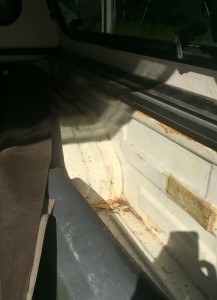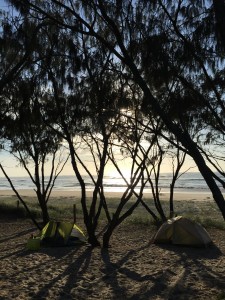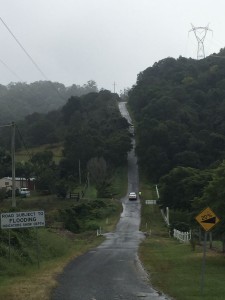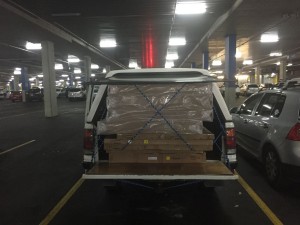Whether it’s the nature of fieldwork in general or the nature of fieldwork in Australia, things that should be simple end up as an adventure.
Let me give you some examples.

The task that should have been simple: grocery shopping. Every week, we go on a shopping marathon to buy food for six for a week. We throw grocery bags in the back of the truck (named Matilda), visit three different stores, since each has better prices for different types of food, and try to feed ourselves properly on a field budget. The complicated process can be attributed to the nature of fieldwork and generally having to rely on a grant. But the creatures of Australia make it more of an adventure. The other week, we opened the back of the truck to throw in the grocery bags, and instead found that a colony of ants had taken over our vehicle.
Since it would be unwise to put groceries in the middle of an ant colony, we had to get rid of them before beginning the grocery-shopping marathon. We drove slightly away from our cottage and tried to sweep them out, but that was highly ineffective. We decided to take Matilda into town and buy some ant spray, only to discover that Matilda no longer wanted to start. Eventually we restarted the car and make it into town, but it took several days to get rid of the ants. We had to carry groceries (for six people with large appetites) on our laps in the car.

Matilda contributes to many of the adventures. She is a car with character. She struggles on any incline and has seen many years and many miles. We camped on the beach on one of our days off, and when we arrived in the middle of the night, we had to push her through several sandy parts of the road in the campground, even though it was a campground for vehicles with 2WD and she supposedly has 4WD.
There’s a large hill that leads to the top of the mountain that we live on, and Matilda has to take it in first gear and shudders all the way up. It feels like we are on a rollercoaster, slowly inching toward the top. Other manual vehicles and trucks also struggle, but not to a similar extent. One day, however, when we got back from the field, a large truck carrying several tons of cement blocks had run out of gas halfway up the hill and had gotten stuck—it couldn’t start up again, and rolling back down the hill was too dangerous since its brakes might have broken. We gave the situation time to fix itself and went into town to buy meat pies and do some errands, but when we came back, we found that the situation had not in fact fixed itself, and our simple task of returning home had become more of an adventure. We listened to “Concerning Hobbits” as we trekked up the hill and walked home.

The rule that generally seems to apply to how situations pan out for us is that second time is the charm. We had to go to IKEA when I first arrived in order to buy bunk beds. It took us an hour to reach the shopping center where IKEA was supposed to be, but we drove around for a while without seeing it. We didn’t have data plans on our phones, so we looked up maps ahead of time and figured that a large blue-and-yellow IKEA building would be hard to miss. This would have been fine and totally normal… if the location we had looked up was for an actual IKEA building, and not the one for which construction was scheduled to begin in May 2015. We discovered this after finally giving up and using the wifi at McDonald’s (which is a lot fancier in Australia). Second time is the charm, so we made it to the actual IKEA on our next try, after a two hour drive in the opposite direction. The bunk bed parts (barely) fit into the back of the vehicle, so we didn’t need two IKEA trips.
This last story, of course, cannot be attributed to typical field struggles, but rather to our own mistake, and also to the fact that having limited wifi time meant that we didn’t properly look up our destination. Living with restrictions on things we take for granted really makes us appreciate them, and this can definitely be said for wifi. We have a “To Internet” list of items we want to look up whenever we get free wifi at a café, and the list grows quickly. We have more Internet access than I expected, but it’s still infrequent and not very fast, and it’s really amazing to me to see how much we rely on it. Our computers swallow us during our limited periods of Internet access, and it always seems that there is not enough time. It makes me wonder how often I’m on the Internet when I have better access. By not having Internet access, though, we discuss and defend our guesses, rather than just quickly looking up at answers to questions we had. I value this; it makes for more interesting discussions, and it makes us think more about what we’re talking about. I’m not blown away by these realizations about the Internet in my life, but I am a little sobered to see how much Internet at our fingertips has impacted our lives.

Our water is not restricted, but we do have to be conscious of how we use it, since it comes from collected rainfall and this is the dry season. But we shouldn’t be careless about water consumption even when we can’t see an emptying water container—we should be using water more responsibly at home, too, even without a visible water supply. Is there some way of having immediate consequences for careless water usage in California, where the drought is not a far-off problem, but doesn’t always seem to hit home for some people? This “field” lifestyle is doing something right, in that sense. Living with restrictions makes for more adventures and stories, and leads to behavior that is more intentional and conscious.
I will say, though, one restriction I don’t appreciate is that my life here lacks black beans. We take turns cooking, and there are a number of meals I have wanted to make that are significantly better with black beans, but black beans are IMPOSSIBLE to find in Australian grocery stores. Lentils, chickpeas, and kidney beans—that’s about it. I have searched more than two times, so “second time is the charm” does not apply to this situation. The search is not over, though, so stay tuned.
